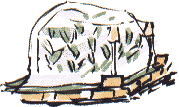


Ducks on the Water
Saturday 8th
April 2000




 Nature Diary
Rocks
History
Workshop
Links
Home Page
Nature Diary
Rocks
History
Workshop
Links
Home Page


A LARGE RED-TAILED BUMBLE BEE, Bombus lapidarius, hovers by an old creeper-covered garden wall. This is probably a queen that has over-wintered and has now emerged to feed up and then to prospect for a nest hole. This bee is found from up to 2,000 metres in the Alps and as far north as Lapland . . . and in back gardens in Ossett.
 This straggly weed, Ivy-leaved Speedwell, Veronica hederifolia, with small four-petalled pale lilac flowers and leaves, similar in shape to those of Ivy-leaved Toadflax, grows on waste-ground and alongside tracks.
This straggly weed, Ivy-leaved Speedwell, Veronica hederifolia, with small four-petalled pale lilac flowers and leaves, similar in shape to those of Ivy-leaved Toadflax, grows on waste-ground and alongside tracks.
I haven't got a magnifying glass to check out the details of its minute flowers so I take a look at it through the wrong end of my binoculars, well one side of my binoculars, holding the flower close to the eyepiece and looking at it through the object glass. It really works; I can see the markings on the petals and long white hairs on the stem.
 A sandstone block of a railway bridge is peppered with ironstone pebbles, one of them as large as a plum. As I understand it, iron dissolved in river water is precipitated when fresh- and saltwater mix in a river delta, in this case in a Carboniferous river delta, 300 million years ago.
A sandstone block of a railway bridge is peppered with ironstone pebbles, one of them as large as a plum. As I understand it, iron dissolved in river water is precipitated when fresh- and saltwater mix in a river delta, in this case in a Carboniferous river delta, 300 million years ago.
Did this pebble build up as a concretion, layer by layer, like an onion. Or did it start as a patch of iron on the river bed and get rolled up in the current, like a roulade or a Swiss roll?
 Driving back from the shops this morning, Barbara has to stop for a pair of Mallards which decide to land on the road in front of her. It is perhaps the same pair that come and dabble on our pond - our first record of mallards actually landing in the garden.
Driving back from the shops this morning, Barbara has to stop for a pair of Mallards which decide to land on the road in front of her. It is perhaps the same pair that come and dabble on our pond - our first record of mallards actually landing in the garden.
 An e-mail with advice on how to make a cloche from recycled plastic bread bags and willow branches puts me in the mood for gardening, and I start making plans as I cut the lawn. Unfortunately I've already lost the e-mail so, if you do read this, Lynne, thank you for the tip.
An e-mail with advice on how to make a cloche from recycled plastic bread bags and willow branches puts me in the mood for gardening, and I start making plans as I cut the lawn. Unfortunately I've already lost the e-mail so, if you do read this, Lynne, thank you for the tip.

Richard Bell,
wildlife illustrator
E-mail; 'richard@daelnet.co.uk'
 Next day
Previous day
Nature Diary
Wild West Yorkshire home page
Next day
Previous day
Nature Diary
Wild West Yorkshire home page

|

 A sandstone block of a railway bridge is peppered with ironstone pebbles, one of them as large as a plum. As I understand it, iron dissolved in river water is precipitated when fresh- and saltwater mix in a river delta, in this case in a Carboniferous river delta, 300 million years ago.
A sandstone block of a railway bridge is peppered with ironstone pebbles, one of them as large as a plum. As I understand it, iron dissolved in river water is precipitated when fresh- and saltwater mix in a river delta, in this case in a Carboniferous river delta, 300 million years ago. An e-mail with advice on how to make a cloche from recycled plastic bread bags and willow branches puts me in the mood for gardening, and I start making plans as I cut the lawn. Unfortunately I've already lost the e-mail so, if you do read this, Lynne, thank you for the tip.
An e-mail with advice on how to make a cloche from recycled plastic bread bags and willow branches puts me in the mood for gardening, and I start making plans as I cut the lawn. Unfortunately I've already lost the e-mail so, if you do read this, Lynne, thank you for the tip.